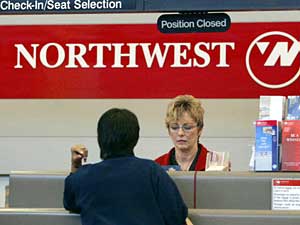|
Audio
Photos
Your Voice
|
United pension bailout could shake up Northwest
August 20, 2004
The nation's biggest airline explained to its bankruptcy judge on Friday why it's stopped making contributions to its pension plans, and why it abandon the pensions altogether. Other airlines, including Eagan-based Northwest, are watching the proceedings closely. What happens to United's pensions could send a shock across the industry.
St. Paul, Minn. — United's massive pension programs cover 120,000 current and former workers. And right now, the plans are short $8.3 billion. When the financial markets turned sour in 2001, airline pension plans suffered along with most other investments heavily weighted in stock.
Strictly by the numbers, United should be putting in hundreds of millions of dollars every few months to catch up. But in court papers this week, United said doing that might prevent the company from ever getting back on its feet. The airline suggested it might have to cancel all of its pension plans. That would leave a $6.4 billion bill with the federal government -- which would pay part, but not all, of the benefits United workers are promised in their contracts.
This is obviously bad news for United workers. But why would workers at competitors like Delta, Continental, and Northwest be worried?
"It will start a chain of events where all the companies will say that in order to compete, they're going to have to terminate their pensions," says Bobby DePace, president of the local International Association of Machinists and Aerospace Workers. Northwest's largest union represents baggage handlers, ticket agents, and other groundworkers.
"If one lowers their fares, the other lowers their fares. If one says it's not going to pay for pensions, the other's not going to pay for pensions. That's just the way the game goes in the airline industry," DePace says.
DePace gives the common examples of the steel industry in the '70s and savings and loans in the '80s, when government bailouts in a few cases soon swept across entire industries. If companies know they can use the government as a backstop, any that don't are at a competitive disadvantage to those that do.
|
Pensions are very important to employees. You'll demoralize them, maybe make them militant.
- Ray Neidl, analyst with Blaylock and Partners |
Northwest declined an interview for this story, saying it doesn't comment on events at other airlines. But clearly the airline could also use some relief from its pension payments. Last year Northwest successfully petitioned to contribute the stock of a subsidiary to the pension pool instead of cash. The airline also joined others to lobbied Congress for an accounting change that lowered its payments.
Northwest's pension plans are currently underfunded by $3.75 billion. The airline has given no indication it would go the route United is suggesting. But airline financial analyst Ray Neidl with the firm Blaylock and Partners says a break for United would put Northwest in a difficult position.
"This will put a lot of pressure on the other legacy carriers to make modifications" in their pension plans, Neidl says. "They're not in bankruptcy and it will be even more difficult to make the changes outside of bankruptcy because you need complete employee involvement."
Neidl says if United escapes its pension obligations, Northwest and other airlines will almost certainly have to deal with the issue. But it won't be pretty.
"Pensions are very important to employees," Neidl says. "You'll demoralize them, maybe make them militant. This is a service business, and if that affects service that will drive away customers and revenue."
The Northwest union president, Bobby DePace, says in the United situation both extreme outcomes are bad: If United gets bailed out, his workers' pensions could be next. But if the airline is allowed to founder, maybe even collapse, he says the industry would be chaos.
"What we'd like to see is that somehow some type of extended payments, something the government can do to make it easier for United to pay their benefits," DePace says.
In court today in Chicago, United softened its stance, saying it did not want to make what it called a "precipitous decision." But the bankruptcy judge also rejected union arguments against the airline's pension proposals.
At Northwest, the company remains focused on cutting labor costs in other ways. Three of four major unions have so far refused to budge. But the airline and it's pilots union are currently in talks, and could reach an agreement this fall.
|
News Headlines
|
Related Subjects
|

